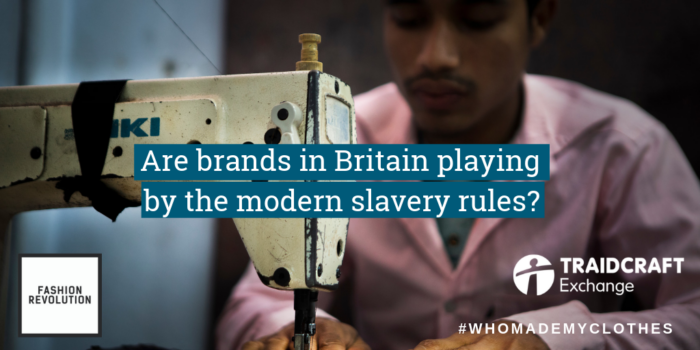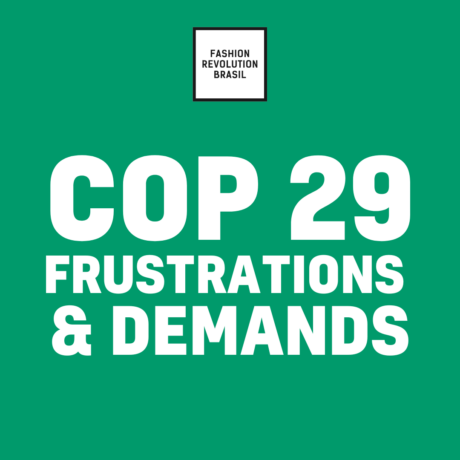Fashion Revolution’s Statement on the UK Modern Slavery Act and Accountability
According to reports published today, UK prime minister Theresa May is set to announce new transparency and compliance measures to enforce the Modern Slavery Act, which initially came into effect in 2015.
What is Modern Slavery?
According to Anti-Slavery International, Modern Slavery includes 1) forced labour: any work or services which people are forced to do against their will under the threat of some form of punishment, 2) bonded labour (or debt bondage): the world’s most widespread form of slavery, when people borrow money they cannot repay and are required to work to pay off the debt, then lose control over the conditions of both their employment and the debt, 3) human trafficking: the transporting, recruiting or harbouring people for the purpose of exploitation, using violence, threats or coercion and 4) child slavery: different from child labour, child slavery occurs when a child is exploited for someone else’s gain. It can include child trafficking, child soldiers, child marriage and child domestic slavery. The global fashion industry remains one of the biggest drivers of modern slavery, with more than one hundred billion pounds worth of garments at-risk of modern slavery imported into G20 countries in 2017 (Walk Free Foundation).
The Modern Slavery Act:

The Modern Slavery Act requires fashion brands and retailers operating in the UK to report annually on their efforts to eradicate modern slavery throughout their supply chains. Since its passing into law, the government has failed to hold brands accountable by ceasing to monitor who is reporting.
During Fashion Revolution Week 2019, we ran a joint campaign with international nonprofit Traidcraft Exchange, asking our community to sign a petition to demand that the UK government take responsibility for enforcing its own law. With nearly 5,000 signatures, the petition clearly demonstrated public support to strengthen the Modern Slavery Act.
Fashion Revolution Co-founder, Carry Somers, said of the petition, “Our recommendation is to begin by strengthening the UK Modern Slavery Act transparency requirements through a variety of actions and the first of these should be the establishment, maintenance and monitoring of an easily searchable public database of the companies that are required to comply, alongside a copy of their annual statements.”
What to watch for in Theresa May’s announcement:
We are pleased to see Theresa May continuing to take action on this critical issue (May supported the bill in 2015, when she served as home secretary), which affects the livelihoods of so many workers in the garment supply chain and beyond. According to reports, May will announce the creation of a government registry where brands’ Modern Slavery Act reporting will be made public. While we commend this step towards accountability, we also believe that transparency should extend to the brands that cease to disclose. There must be concrete consequences when brands fail to uphold their duty in reporting to ensure that compliance becomes the norm.
With this announcement expected to take place this evening at the ILO’s International Labour Conference, we will be paying close attention to the commitments outlined, and hope for a proposal that increases both transparency and accountability.
The strengthening of the Modern Slavery Act represents one of the many needed solutional responses to human rights abuses in the fashion supply chain. This is why we believe that we must continue to ask #WhoMadeMyClothes and work towards more concrete actions to ensure a fairer, safer, and more transparent fashion industry.
UPDATE: 13/06/2019
Theresa May’s full speech at the ILO conference on 11/06 can be read in full here. In it, she committed to a public database, which would list the companies who report on Modern Slavery, making their annual statements fully transparent.
In response, you can read in excerpt from Traidcraft Exchange’s statement below:
“Here’s where the detail is important. We didn’t ‘just’ ask for a public database – we asked for a public list of all companies required to publish a modern slavery statement too. This is every company operating in the UK with an annual turnover of over £36 million. The list is critical to the database’s success – without it you can search the database as much as you like but you won’t be able to find the worst offenders because they won’t even have bothered to publish a statement. Customers, NGOs and investors won’t be able to know how serious a company is about doing its bit to end modern slavery.”
Now, we need to go a step further. We need to ask the government to list the companies who fail to comply and ensure that effective consequences are in place. Sign our Traidcraft Exchange petition here.








